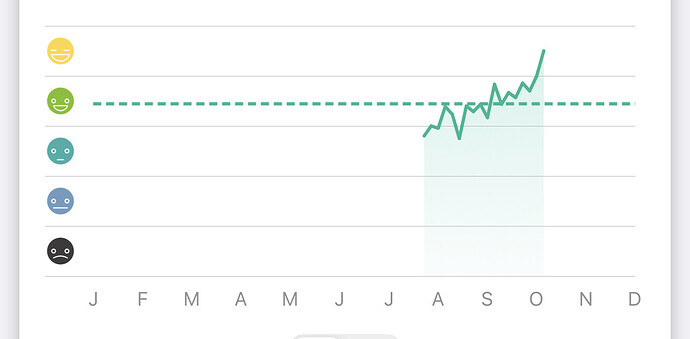Something I’ve noticed about this ‘committing to the emotion 100%’ is that it forces me to focus on just one emotion, which helps on a couple of fronts.
Normally we follow a chain of emotions, with each reacting to the previous. This is what makes it possible for ‘me’ to maintain, because ‘I’ can’t just have one emotion all the time. So I cycle.
For example, earlier I was reminded of my ex and I felt a pang of fear, followed by sorrow, followed by worry that I’ll feel that way for a long time. Ironically, I had already moved on from the sorrow - to worry!
Another example might be feeling anger, followed by remorse, followed by sorrow about the remorse, followed by worry about the sorrow, followed by anger…
When I pick whichever emotion from that chain and consciously ‘be’ it, I soon find that that emotion cannot maintain itself for long. Some have more ‘staying power’ than others, but pretty soon, I lose interest. Even something that a moment ago seemed of earth-shattering importance!
This has greatly helped me stop ‘believing’ in the emotions… if it’s so important, why can’t I keep feeling that way? Even when I am consciously trying to feel it? The circumstances haven’t changed, but my emotion fades away pretty quickly.
Also by focusing on one emotion at a time rather than letting the chain play out, when the particular emotion fades away, it’s mainly replaced by delight (wow, that didn’t have much staying power at all) and satisfaction of a job well done - I could have just gone along the emotion-chain as usual, but this time I remembered to pin it.
Normally, ‘I’ find whatever emotion quite unpleasant and will do anything to get away from it - which really means hopping to the next emotion - and ‘finding something unpleasant’ is an emotion in itself. By committing to something 100%, I’m choosing to stay there, to look at it. It has a similar character to Richard’s describing taking back his autonomy. By my own autonomous choice, I’m embodying this or that emotion. And by making that choice, I have an interest in it, rather than trying to escape. It’s the perfect opportunity to learn things about the emotion, and about how ‘I’ operate - it’s hard to make observations when running away from something.
Last night I also observed ‘me’ being ‘blank,’ which almost seems like a different category of emotion - dissociation. It appears it’s something I learned to do to ‘cope’ with the emotion, but it also keeps them at a distance, where it’s impossible to commit to them 100% and thus reap all these benefits. The first thing I had to do was remove this ‘cover’ of blankness.
With committing 100% to the emotion, some lasted longer than others, but each time I arrived at a similar conclusion: it became obviously pointless to continue feeling that way.
Because normally we enter the emotion-chain, each emotion is avoided and rushed to the next reactive one, but with staying in the one (and committing to it), it quickly becomes obvious that the emotion is not achieving anything beyond making myself (and others) uncomfortable.
In a moment I can be mad at my friend because of something he did, but by saying “ok, I’m going to be REAL MAD for AWHILE” it began to feel pretty silly just sitting there seething and doing nothing. Me seething doesn’t do anything to change his behavior for the better. Might as well stop being angry…
Feeling good exits that whole scene, because feeling good is inherently enjoyable and is also beneficial for my actions - and the people around me, and humanity as a whole. That is worth committing 100% to.
This is all going very well 

